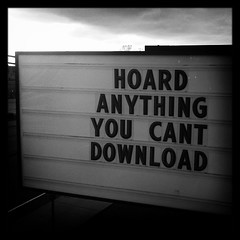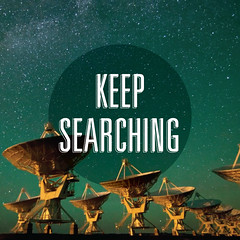(reposted from Scott Leslie’s edtechpost blog)
OK, so “OER Librarian” is a bit of a stretch – much as I might secretly harbour a desire to be a librarian, I don’t even play one on TV. But recently I was asked to help find some suitable Open Textbook alternatives for a collaborative program in ICT here in BC, and I wanted to reflect on this process and this potential role of “OER Librarian.”
The Request
The initial request was to find suitable open textbook replacements for the “Foundations of Web Development” course and two database courses, “Database Design” and “Database Management.” These are but 3 of 18 courses that make up the program, all of which have both course outlines and learning outcomes well described and existing commercial textbooks in use. Both of these are VERY handy to have as reference when looking for alternatives.
 As an aside, one thing I found odd was searching for “textbooks” at all in these areas. We’ll leave aside the whole question of what, in the networked, digital and open age, constitutes a “textbook” anymore – that’s an issue I plan to pick up in my next post. But when it comes to “ICT” and specifically technologies like web development and MySQL, the furthest thing from my mind when I think of learning these is to turn to a “textbook.” The web is literally strewn with good tutorials and references in these areas, ones that aren’t static but live and grow with new releases and learning by their communities. And these were for courses delivered entirely online! And yet…
As an aside, one thing I found odd was searching for “textbooks” at all in these areas. We’ll leave aside the whole question of what, in the networked, digital and open age, constitutes a “textbook” anymore – that’s an issue I plan to pick up in my next post. But when it comes to “ICT” and specifically technologies like web development and MySQL, the furthest thing from my mind when I think of learning these is to turn to a “textbook.” The web is literally strewn with good tutorials and references in these areas, ones that aren’t static but live and grow with new releases and learning by their communities. And these were for courses delivered entirely online! And yet…
As my contact explained to me, students were themselves asking for a physical textbook to accompany their course in cases where one didn’t already exist. Fair enough. And in addition, while the instructors were well aware of the reams of materials available for free online and how they could simply point to these, increasingly they were tiring of the ever-present link-rot, finding that each term whole sections of their course would contain broken links due to the seemingly natural decay on the web. Hence – open textbooks!
The Process
I started searching specifically for materials for these 3 courses and quickly realized that I was finding candidates not only for these subjects, but for many of the related courses and topics in the program. This led me to my first insight and action, which was that while you may be searching for one specific thing, it would be foolish of me to simply discard these related quality results. So I expanded the page where I was capturing all of the candidates I’d found to include all of the courses in the ICT Program. It turns out this was a wise thing to do, as even though I hadn’t been asked to find replacements for these others, in two cases when the instructors say how well the free and open candidates fit the course, they felt these would be easy choices. Score one for the good guys!
I am not ashamed to say that one of the first places I turned to wasfreelearning.ca, the OER search portal I built on top of delicious and Google CSW. The first thing I learned was that it had broke (doh!) The whole delicious move had caused some things to go out of whack. Once fixed, I found a few resources, but even though we’ve tried to constrain the open textbook search to just textbook sources, I admit a fair bit of cruft still gets through.
The next obvious (to me) place to turn was College Open Textbooks. They have a large collection of open textbooks classified by Subject that is up to date and added to regularly, in my experience. This turned up some decent possibilities.
College Open Textbooks is a curated collection, and one of the sources they pull from is Connexions. But a direct search of Connexions didn’t find anything particularly different. Similarly wikieducator and wikibooks, other sources the College Open Textbooks aggregates, didn’t offer a lot more than I had found earlier.
 I kept trying a bunch of individual sites,FlatWorld Knowledge, Free Technology Academy, and FLOSS Manuals. In each found a few good candidate open textbooks. But still no motherload. I decided to turn to some of the major aggregators/OER portals, the two biggest IMO being OER Commons andMERLOT. I was encouraged to see in MERLOT that “open textbooks” had become a category I could refine a search on, and did find some decent choices But the specificity of this filter is thwarted by a lack of quality control on what gets classified as such, and by the seeming desire to be as inclusive and comprehensive as possible. OER Commons suffers from a similar fate, and in each case finding duplicate upon duplicate would easily discourage most faculty.
I kept trying a bunch of individual sites,FlatWorld Knowledge, Free Technology Academy, and FLOSS Manuals. In each found a few good candidate open textbooks. But still no motherload. I decided to turn to some of the major aggregators/OER portals, the two biggest IMO being OER Commons andMERLOT. I was encouraged to see in MERLOT that “open textbooks” had become a category I could refine a search on, and did find some decent choices But the specificity of this filter is thwarted by a lack of quality control on what gets classified as such, and by the seeming desire to be as inclusive and comprehensive as possible. OER Commons suffers from a similar fate, and in each case finding duplicate upon duplicate would easily discourage most faculty.
The full set of sources I searched is available here. To that list I would add both straight-ahead Google and Bing searches, which were by and large not very productive – lots of results, very few of which were either textbooks or open.
What I Found
There are 18 courses in the ICT Program (not including the Capstone project which doesn’t use a text). In around 7 hours of search I managed to turn up 41 potential candidates for 12 of the sources. Not all of these are explicitly “textbooks”; maybe half are, the other half being courses or manuals that could serve this purpose. The informal feedback I received from my contact at the ICT Program was that in two cases the candidates seemed holus bolus like good replacements. In two others there were ones that with work might serve as the basis for a new textbook.
So let’s say, for arguments sake, that this effort results in 4 commercial texts being replaced with free and open alternatives. These courses are delivered by 4 partnering institutions. So maybe conservatively 50 students/year x 4 courses? At $100/textbook? That’s a $20,000/year. Even if we include a $10,000 one time cost to transform 2 of these to be more suitable, that’s still a potential $10,000 savingsin the first year passed on to these students. It is of course not as simple as that, but seems very easy to illustrate the value of this exercise and approach.
What I Learned
- Google on its own won’t save you – generic Google search was nearly useless for this – using “textbook” as one of your search terms doesn’t particularly help, nor does it’s advanced search with usage rights particularly guarantee that you will actually be able to reuse the results.
- Open is as Open Does – if you want free (and open) textbooks about ICT, teach open source platforms and apps. While there was an absolute dearth of open textbooks around proprietary platforms like Microsoft, there were serveral high quality open textbooks on Linux easily available. This sounds obvious, and clearly there are proprietary softwares that people still want to get formal instruction about, but we have to remember that one of the freedoms preserved by free software is the freedom to LEARN.
- OER Portals can help… – there are a few decent OER portals, but there is definitely no single “one stop shop.” If asked to recommend to faculty only a couple of general portals (e.g. not specific to any one discipline) then I’d likely focus on OER Commons and Merlot as the two best candidates. That said, discipline-specific engines and portals will almost by definition be better at helping you find what you need, and the extent to which one exists in your specific area, you are fortunate.
- …and yet have some conflicts of their own – in their haste to bulk up their collections, repositories and other search engines have in fact done themselves a disservice as there is often now a lot of crap in them, or a lot of resources of huge heterogeniety of granluarity, usability and quality.
- The “reusability paradox” is a real thing – and its corollary is also true: the large the granularity of thing you are trying to find, the less likely you are to find an “exact match” on any of the specific items.
- It’s all about “the flow” – even if you have some subject matter expertise, if you are not the person ultimately responsible for assembling the curriculum or teaching the course, there will need to be at least one more pass by the people who are, as ultimately they are the ones who will use it. This is not to say that this “OER Librarian” role is useless, far from it, but the ideal for me remains a persistent workflow like I described in the “Open Educator as DJ” where seeking & collecting open content is not something that happens once a year for a few days but an ongoing part of the open educators workflow. Serendipity does not work to a schedule!
- But until then… – Still, what it is showing me is the possibilities of some hybrids; I can foresee a dynamic approach, supported by any number of systems (a wiki might work well) in which, say, a course description and basic outline is first shared, and various content found at that level by someone with some search expertise, and then both the course units and corresponding searches iterated by instructor/subject matter expert and “oer librarian.” If done in something that allowed for easy “clipping” and republishing of collected work into a new textbook, this iterated approach could go a long way to the creation of a new text that worked at all the levels of granularity it needed to.


